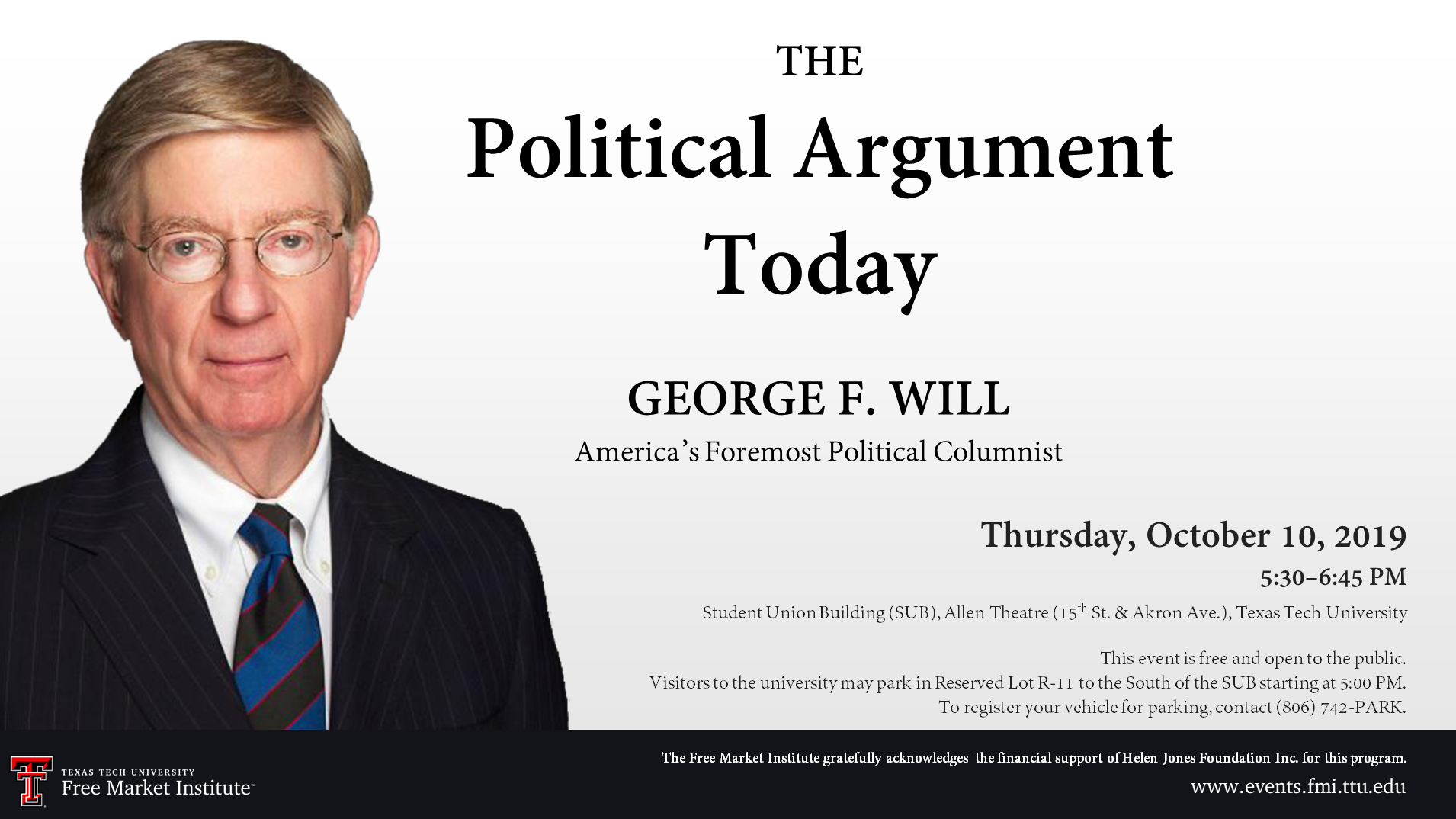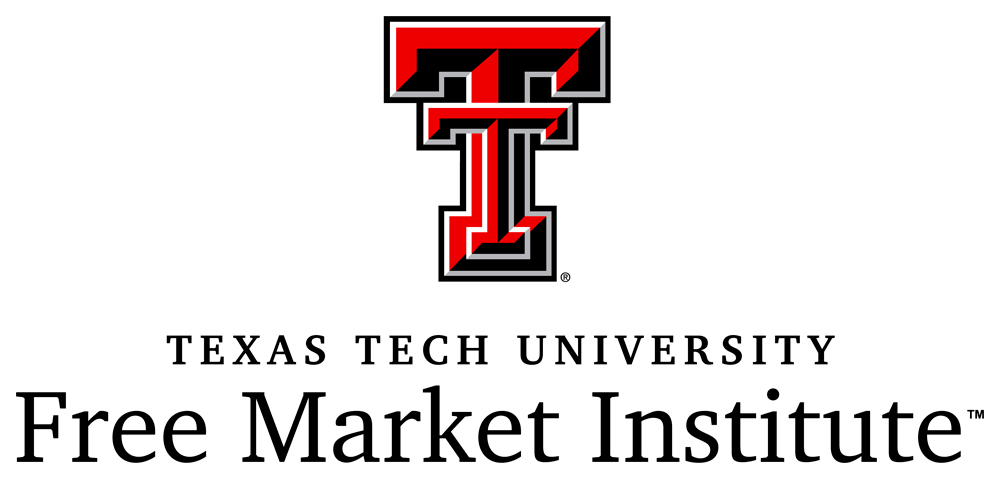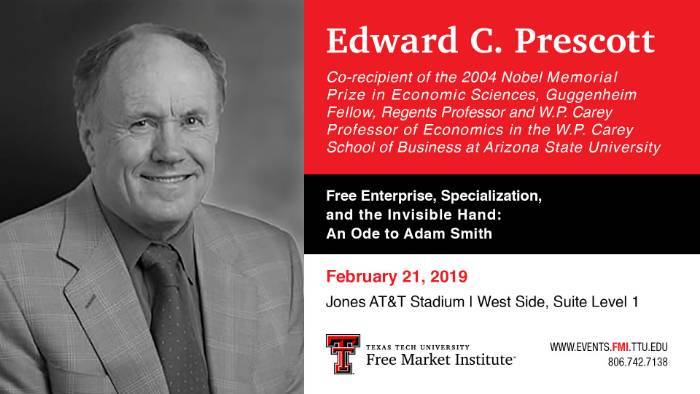Event Archives
FMI Public Speaker Series
November 14 — The Law & Economics of Consumer Credit and the Loan Shark Protection
Act
October 10 — The Political Argument Today
April 25 — Texas and the Heartland: Key to the Future of the American Dream
March 28 — More Sex is Safer Sex and Other Surprises from Economics
February 21 — Free Enterprise, Specialization, and the Invisible Hand: An Ode to Adam Smith
The Law & Economics of Consumer Credit and the Loan Shark Protection Act — November 14
Although Americans love the things they buy with credit cards, they have long been skeptical of the use of credit and the banks that issue them. Credit card issuers have been blamed for multiple ills, but mainly for promoting overconsumption and excess credit.
Todd J. Zywicki delivered remarks for the fall 2019 Public Speaker Series to explain the economics of consumer credit and the history of its use and regulations, and explore why the recently-proposed "Loan Shark Prevention Act," which proposes to create a national interest rate ceiling of 15% on all consumer credit products, would prove disastrous for American families, especially poor families.
The Political Argument Today — October 10

America's foremost political commentator and columnist, George F. Will, presents penetrating and incisive commentary on the Washington political scene, offering a glimpse into what the future holds for public affairs, public policy, and American society.
George F. Will delivered the keynote lecture for the fall 2019 Public Speaker Series on, 'The Political Argument Today,' and provided remarks based on his most recent book, The Conservative Sensibility.
The Free Market Institute gratefully acknowledges the financial support of Helen Jones Foundation Inc. for this program.
Why the North Should Have Seceded from the South: The Political Economy of Slavery and Secession — September 12
The Civil War is justly celebrated for ending slavery in the United States. But was the war actually necessary to achieve that goal? Radical abolitionists, such as the fiery and implacable William Lloyd Garrison, originally advocated Northern secession from the South. They felt that this would best hasten the ultimate destruction of slavery by allowing the free states to get out from under the Constitution's fugitive slave clause.
Was the South's 'peculiar institution' so economically profitable, efficient, and entrenched that only four years of soul-wrenching conflict with a loss of over 700,000 lives could bring it down?
Prof. Jeffrey Rogers Hummel, Professor of Economics at San Jose State University, addressed these questions and more for the fall 2019 Public Speaker Series lecture on 'Why the North Should Have Seceded from the South: The Political Economy of Slavery and Secession.'
Texas and the Heartland: Key to the Future of the American Dream — April 25
Joel Kotkin visited Texas Tech University to deliver a lecture for the Free Market Institute (FMI) Public Speaker Series. Mr. Kotkin discussed his ongoing research focused on the challenges and opportunities for urban and regional development in the United States, as well as the role that Texas and the Heartland can (and likely will) perform in those processes.
Described by the New York Times as "America's uber-geographer," Joel Kotkin is an internationally-recognized authority on global, economic, political and social trends. Mr. Kotkin also serves as Executive Director of the Houston-based Center for Opportunity Urbanism and Senior Advisor to the Kem C. Gardner Policy Institute. He writes the weekly "New Geographer" column for Forbes.com, serves as Executive Editor of www.newgeography.com, and is a regular contributor to The Daily Beast and Real Clear Politics.
More Sex is Safer Sex and Other Surprises from Economics — March 28
"Daughters cause divorce. A thirst for revenge is healthier than a thirst for gold. A ban on elephant hunting is bad news for elephants, and disaster relief is bad news for the people who receive it. Malicious computer hackers should be executed. The most charitable people support the fewest charities. Writing books is socially irresponsible; elbowing your way to the front of the water-fountain is not. The tall, the slim, and the beautiful earn higher wages—but not for the reasons you think. Each of those statements is closer to the truth than you might imagine. If your common sense tells you otherwise, remember that common sense also tells you the earth is flat." (Landsburg 2007).
The Free Market Institute (FMI) hosted Prof. Steven E. Landsburg as part of the spring 2019 FMI Public Speaker Series program on March 28, 2019. The lecture focused on his work demonstrating the often counterintuitive, and sometimes surprising, conclusions that emerge from the careful application of economic principles and insights.
Free Enterprise, Specialization, and the Invisible Hand: An Ode to Adam Smith — February 21
The Free Market Institute hosted Prof. Edward Prescott, who is the co-recipient of the 2004 Nobel Memorial Prize in Economic Sciences, for the spring 2019 keynote public lecture. Prof. Prescott's remarks addressed the evolution of economic thought regarding the efficiency of market outcomes. In particular, Prof. Prescott emphasized the insights of Adam Smith, arguing that many insights in modern economic thought can, indeed, be traced back to Smith's views on the operation of economic processes.
A reception followed the lecture to feature a display of original, early edition works authored by Adam Smith from the collection of The Remnant Trust at Texas Tech University.
[Back to Upcoming Events] [Back to Top]

Free Market Institute
-
Address
Texas Tech University - Box 45059 - Lubbock, TX - 79409-5059 -
Phone
806.742.7138 -
Email
free.market@ttu.edu

